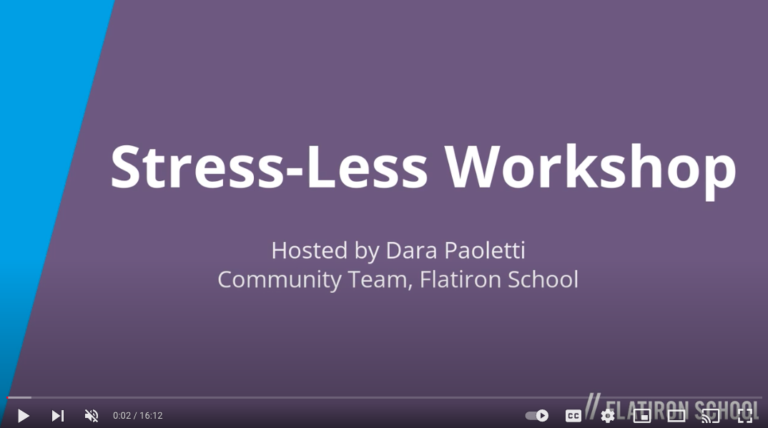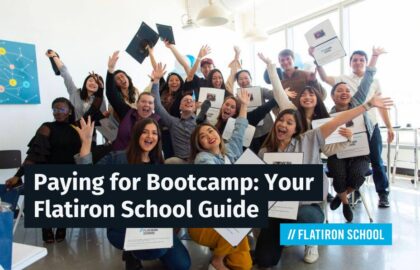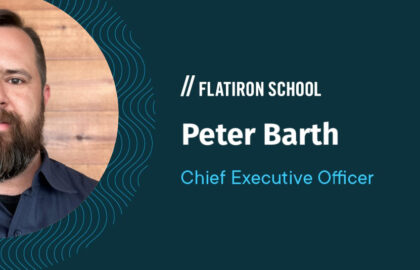Changing careers can feel overwhelming — intellectually, technically, and emotionally. Some students get this support outside of Flatiron School, like through family, friends, a partner, or a roommate, but even these people don’t know what you are going through.
Whatever you’re feeling — be it self-doubt or imposter syndrome — our Community Team is here to help with the transition.
Check out this interview with Emily Doyle, Director of Student Community at Flatiron School, as she talks about how we build community at Flatiron School.
What is the Community Team, and why is it an important part of the program at Flatiron School?
At Flatiron School, our goal is to help students be successful during the program, and also to complete the program with the network and networking skills they need for a successful job search and career. Our team focuses on building events, experiences, and connection points to foster connection, support, and skill building — no matter if you choose to learn online or in-person.
Each cohort is assigned a point of contact from the Community Team. This person helps facilitate connection within your cohort by kickstarting conversations in the Slack channel and sharing upcoming engagement opportunities, but they’re also a resource for any non-technical questions you have about your program.
How do you start building connections from day 1 at Flatiron School?
We start with a new student mixer, and the goal is for new students to forge connections that will be the beginning of their support network at Flatiron School. This is a chance to connect with people in your cohort, but also to meet people across our other programs.
You will also be invited to our student Slack workspace. We have created a lot of different slack channels where students can get support, whether it’s technical or motivational, camaraderie support.
Our perspective is that by creating relationships, you not only benefit from having those relationships but you also begin to build the skill of networking. The ability to forge connections early in your program will make it easier to start networking when you are heavy into the program. And, of course, tech is a field where networking is important during your job search, so learning the skill early is important.
What is the community experience for online cohorts versus in-person cohorts?
We built all of our community events with accessibility and a remote-first approach in mind. The goal is that any student — regardless of what program they’re enrolled in — gets access to the same programming. The events may be executed a little differently, but the idea is that all events are the same types of events — networking, hackathons, guest speakers.
So if you’re an in-person student, you can attend all of the events that are hosted online, and if you’re an online student, you could access recordings of in-person events. The philosophy is that there’s one offering, but each student accesses the offering in the way that works best for them.
What are some examples of the types of events that students can attend?
Our team facilitates an ongoing schedule of programming designed to help students connect with each other and get the motivational support and encouragement they need. We create opportunities for students to make friends and network through happy hours and new student mixers, and ensure that students stay motivated and inspired by attending alumni AMAs and guest lectures, plus get the emotional care they need via wellness events like meditation and yoga.
We also like to host events that allow students to get important job search and career practice in a comfortable and welcoming environment. This usually looks like hackathons, project presentation showcases where students can receive feedback, and discussions on current topics in tech. These are all skills you will need in the “real world” — like how to talk about technical topics and discuss current trends in tech with colleagues — so we give you some structure and encouragement while you’re in the program to make it all easier after you graduate.
Here’s a sample of a community event you could be part of at Flatiron School.
What’s new on the Community Team this year?
As the pandemic continues, we know everyone is feeling a lot of “zoom fatigue” so we are working on creating more “asynchronous” programming — ways to build community on your own timetable without being committed to one more zoom meeting. We’re beginning to pilot these async opportunities through Slack channels for affinity groups, such as underrepresented or historically underserved and excluded groups in Tech. We’ve created space for students who identify as Black, LGBTQIA, veterans, parents, Latinx, women, and AAPI to connect. We also have monthly meetups for these groups that are really geared towards facilitating the unique support these students might need. This is just one area of our asynchronous building — we’re really excited to do more in the coming year!
So how can we help students stay excited about what they’re doing and reconnect with the goal that they have in doing this program in the first place?
One way we try to keep students excited and motivated throughout the program is through guest speaker sessions. We invite guest lecturers who work in software engineering, product design, cybersecurity, and data science to share their career journey or a deep dive into an interesting topic. These events are really designed to not just inspire students and help them see what might await them in their new career, but also to help kickstart students’ networks, as some students might attend a guest lecture and then go on to start a conversation with the speaker.
Overall, these events really show students that there are people out there in the industry doing this and they’re real people, and give students a chance to get their questions answered. In addition to these guest lecture events, our alumni AMAs also provide a jolt of inspiration by getting to hear from grads who have shared in their exact experience and can give advice for the road ahead.





